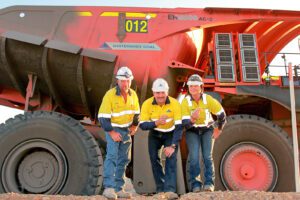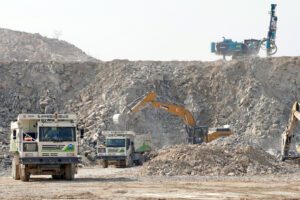The recent moves by miners to automate mining equipment through technology has created significant debate among mineworkers regarding the loss of jobs and the impacts on regional communities. There’s clearly no doubt that automation will displace workers, yet many Government’s within Australia and abroad appear to have not really got their heads around the actual specific economic and social impacts to communities, let alone the implications on a range of Government revenues through lower taxes.
Is it because they don’t know or are sitting back waiting for someone else like BHP to make the first move?
The present-day reality is that many Australian mineworkers fear a dystopian future where they will be replaced by machines. This reality must be managed from both a Government and corporate perspective lest the potential effects for communities and governments could be catastrophic.
The debate on automation
The debate by those in support of more application of automation technology in the Australian mining sector has been driven around increased productivity, improved safety and the creation of new more rewarding job opportunities. Others see that the rise of artificial intelligence across many sectors will have a plethora of direct effects on workers themselves and Government economics.
Global Shapers Melbourne summed up this debate in a submission to a Senate Select Committee:
“The debate on these transformations is often polarized between those who foresee limitless new opportunities and those that foresee massive dislocation of jobs. In fact, the reality is highly specific to the industry, region and occupation in question as well as the ability of various stakeholders to manage change”
Select Committee on the Future of Work and Workers, Submission by Global Shapers Melbourne, Submission 22, pp. 2–3
What is the reality for mine worker across Australia?
A report released by METS Ignited and NERA 3 months ago highlighted that 40,000 frontline mining jobs will go by 2030. At the same time, it said, “the loss of jobs will be offset by 69,000 new jobs in the supply chain and another 53,000 new jobs in the wider economy.”
In essence, the reality is that change is already upon the industry and the likely impacts will affect Australian mine workers sooner or later. How it will affect them is likely to be the key. It’s all very well to look at the big picture, but it will be the impact on individual mine families, towns and regions that will be the key to shaping a successful transition.
Automated machines clearly won’t buy coffee from the local store, they don’t get haircuts and they don’t pay rent, electricity or rates on houses. Quantifying those intangible losses to communities will, in itself, be potentially problematic for Government and mining companies.
The CFMEU’s District President Stephen Smyth has been a long term campaigner for considered approaches to automation across the mining industry, having moved a motion at this year’s Queensland State Labor Conference to take a stand against automation.
Smyth argues that mining companies who automate processes and sack workers should pay additional royalties to the Government to offset the impact of the job losses on regional communities. He has also suggested that automated mines should lose access to the generous diesel fuel rebates provided by Government.
Smyth previously told the Courier Mail that “Automation and technology will frame our industry but it shouldn’t be a given we should accept it. People shouldn’t be falling over themselves to embrace this new technology.”
He might have nailed a point to the wall recently when he added to the debate “We understand that mining companies will push to maximise their profits at every opportunity. That’s why we need governments to step up and make sure that these companies earn their social license to operate. That includes understanding how communities will be affected by automation and intervening to make sure regional Queenslanders don’t pay the price.”
But Smyth may also have other secondary concerns. Automated machines don’t join unions and they certainly won’t add to the state of union membership in mining in Australia. Current ABS rates show declines from 44.6% in 1994 to 17.7% in 2016 (It is noted that industry downturns affect union memberships).
Certainly, the proposed 58000 new technology-based employees in the mining supply chain may be quite removed from the CFMEU’s traditional membership base.
Global attention emerging on automation
Last week, US Presidential candidate Bernie Sanders drew global attention when he stepped into the automation debate proposing a range of Government methodologies to deal with automation from both a worker and fiscal perspective.
Sanders, in one of his pitches for the presidency, said “This exploding technology must serve human needs, not just corporate profits. As president, I will require firms to convey shares to workers who are laid off due to offshoring or automation”
“I will work to prevent workers from being displaced by automation in the first place. We will end tax breaks that encourage companies to replace American workers with robots” Sanders added.
Another US Presidential Candidate, Michael Bennet, has also stepped into the debate saying “Companies have a responsibility to consider how their innovations will affect the workforce and society more broadly, and wherever possible, invest in training existing and future employees for jobs that will be available well into the future. At the same time, the government needs to develop a sensible, forward-thinking policy to harness innovations so that they lead to more jobs with better wages and working conditions, rather than fewer jobs with worse pay and conditions.”
Local attention on automation
Various Australian Government’s have tiptoed around the edges of automation policies preferring to invest in the future than to deal with detail in the very near present. A plethora of announcements by Australian state’s focus on a STEM future for our children but lack detail on how Government’s will manage large scale transitions to automation, like those emerging now in the mining sector.
WA has been ground zero when it comes to automation. It’s around 10 years more experienced than other states and has seen a limited number of casualties from the automation transition…although incomplete. Redundant personnel reportedly either retired early or picked up work in non-automated pits in WA or the eastern states. The effects were reportedly less severe on the industry than is expected from the east coast transition.
WA has also announced the first Certificate II Courses in automation earlier this year, a co-operative initiative between the Western Australian Government, Rio Tinto and TAFE WA.
Rio Tinto Iron Ore chief executive Chris Salisbury said, on opening the new WA Automation Courses, that Australia’s workforce was in the midst of an important shift as innovation and technology created new business models across all industries. “The work of the mining industry is changing and we need new skills, mechatronics, robotics, data analytics. These courses are part of attracting that next generation of workers and obviously contributing to the safety and productivity of our existing businesses” he said.
Additionally, a Robotics, Automation and AI Command and Control Centre jointly was announced by the Hon Karen Andrews MP, Minister for Industry, Science and Technology and the Western Australian and Western Australia’s Minister for Innovation and ICT; Science, the Hon Dave Kelly MLA and the list goes of trendy announcement seemingly goes on and on…….
Queensland LNP puts a stake in the ground
Queensland Opposition Leader and Member for Nanango, Deb Frecklington, like Stephen Smyth from the CFMEU, has been outspoken on the issue of automation in the mining industry.
Ms Frecklington said approvals for the BHP Goonyella Riverside mine near Moranbah should be reviewed in light of the company’s decision to slash its local workforce. “The LNP will oppose any shift to automation that destroys existing jobs in Queensland’s resources industry. Mines in Queensland are approved on the basis of the jobs they will create. If mines no longer offer those jobs, their approvals should be reviewed.”
“Let’s be very clear, Queenslanders support mining because of the jobs and economic prosperity it creates in the regions and for the state as a whole,” she said.
Time will tell if Government’s will rise and mitigate the effects of a dystopian future for mineworkers. What’s clear right now is that Australian mineworkers need assurances that Governments and society won’t leave them on the scrap heap when it comes to technological transition. Australian businesses in regional mining towns also need the support to transition to an autonomous future.
Talk is cheap and arguments are aplenty when it comes to mining automation, it’s value and automation displacing workers…but ensuring that we consider and support those most likely to affected by the transition remains an important social legacy for future generations of Australians.
References
Sources: 1994, 2000 and 2010: ABS, Employee Earnings Benefits and Trade Union Membership, cat. no. 6310.0; 2016: ABS, Characteristics of Employment, cat. no. 6333.0














At my minesite which is going over to automation has taken the stance that staff need to be culled and any safety breach no matter what, has been a cause to stand down and terminate. So any company saying they will find jobs for all staff are false, it will only be the ones that survive the safety cull.
We are talking staff that have been 10 years plus.